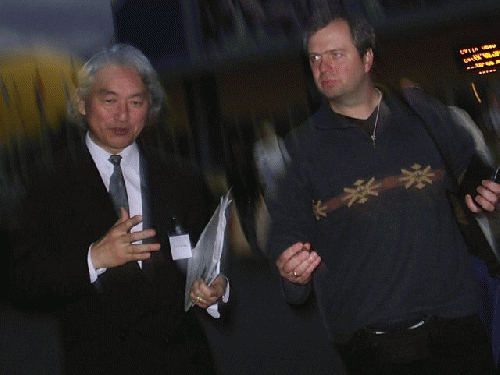Stefan Thiesen: The survival question in connection with complexity: how about disturbing complex systems we don't understand - like nature, like ecosystems, like the climate system...
Michio Kaku: It is very dangerous. We live in a web as they like to say and if you just jiggle one web you think that the next link is gonna change but of course it doesn't. It affects all other links in the chain, so it's quite dangerous the way that we are dependent on our ecosystems and that were changing our ecosystem so much. For example, five food crops return most of human diet. Five food crops, okay? Rice and wheat and things like that. Corn. Five crops. That's very dangerous because if we sit on top of the food chain and all of a sudden corn-blight or a wheat-blight affects all the rice and wheat and corn output, billions would starve as a consequence. You can affect the destiny of nations so we're quite dependent upon our environment, and it is a very narrow environment. It is a very narrow environment - we're dependent on a handful of animals"
ST: We've created this situation.
MK: We have created a bubble! A bubble on the top of the food chain. And it would not take very much to dislodge us because we live in a bubble. Five crops, a few animals that's what we depend upon. Cattle, sheep, pigs, chickens and five basic grain crops. That's very dangerous. And so hmm, you know sixty five million years ago a comet or meteor hit the Yucatan of Mexico and perhaps wiping out the dinosaurs. In some sense we are another comet. We have now hit the Earth. We are now destroying animal life on a scale not seen since sixty five million years ago.
ST: But if we are stuck on the planet for another few thousand years or a few hundred years at least, don't we have to stop growth?
MK: No. I think what's gonna happen is that there's gonna be some real big shocks. I think there are gonna be some real big shocks.
ST: But then growth also stops.
MK: Temporarily. I think there will be shocks. We're gonna be running out of oil pretty soon, the atmosphere is heating up very rapidly. Most people do nothing about it because they like their SUVs, they like their lifestyle, but the Earth is changing very rapidly now, and I think nothing has been done about it. So - I think humanity, unfortunately, won't do anything until there's a big shock. That's how humans move. Humans don't move until they have to move. In fact I'm sure evolution prefers organisms like that. So our brain is architectured to not do anything until there's a mortal threat to us. So I think there will be a mortal threat. I think it will come to the point where there are designer germs, where maybe an atomic bomb escapes, where the ice poles, the polar ice caps begin to melt and crack apart. I think it will take serious emergencies for the average person to wake up. Which is very sad but that is probably why in outer space there are probably be a lot of type zeros that never made it to type one. There are probably a lot of dead planets where atomic bombs did go out. Their atmospheres are radioactive. Their atmospheres are very hot and there's no life there anymore. Type zeros are probably fairly common. Type ones are probably rare. Type zeros are fairly common. So that's a lesson. If we want to be able to become type three, then we have to make sure that we don't budge it.
ST: So we should absolutely not be arrogant in any way.
MK: I guess that we should be humble throughout these things.
----
So far the 2003 Interview. I myself have always said: a technology too dangerous to fail is too dangerous too exist. The fallouts, quite literally, from the Fukushima incident may blow every human scale and imagination. Six tons of Plutonium in reactor 4 - it takes only 0.015 tons to build a nuclear bomb. It takes only a single Plutonium Atom to cause cancer. I feel reminded of the old couple in the 80s animated movie "Wherever the wind blows." They survived a nuclear war but could not comprehend what it meant, radioactive isotopes in the water, the air, and accumulating and magnifying along the food chain and therefore in themselves. Can we? Do we generally understand that each and everyone of us is a part of the global food chain, a part of the global flows of matter and energy? And the North Pacific is the World's major fishing ground...





